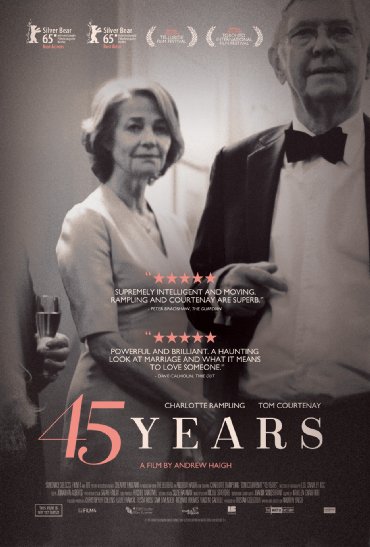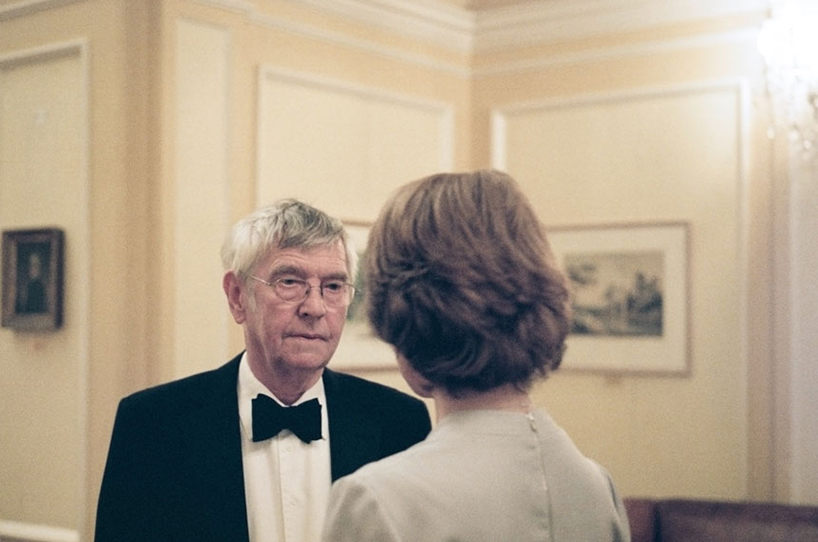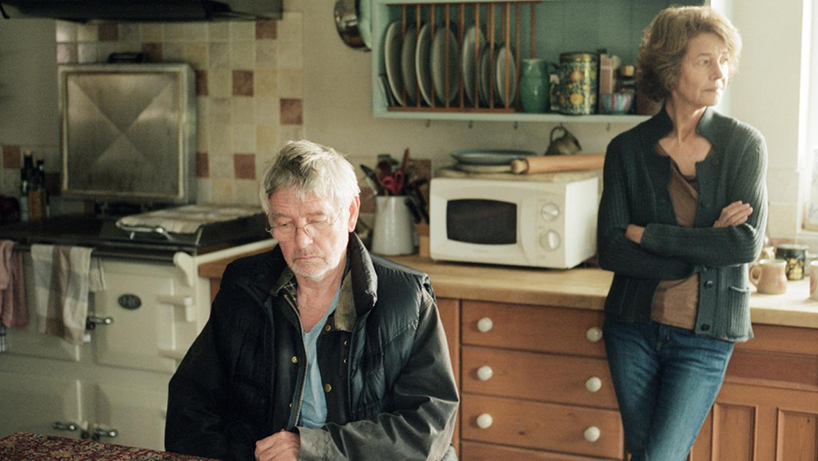Black Tie, Pink Noise
 45 Years develops slowly as a sullen and cynical portrait of long-term relationships. Such relationships are are not merely things to work at amid inevitable ups and downs, they are insular cocoons of secrets and regret. I don’t share this outlook, yet I can still say that 45 Years is in fact a high quality film.
45 Years develops slowly as a sullen and cynical portrait of long-term relationships. Such relationships are are not merely things to work at amid inevitable ups and downs, they are insular cocoons of secrets and regret. I don’t share this outlook, yet I can still say that 45 Years is in fact a high quality film.
Nominated for an Academy Award for her performance as Kate, Charlotte Rampling is piercing as a wife betrayed upon learning that her husband Geoff (Tom Courtenay, in an increasingly rare big screen outing) never quite got over thefirst great love of his life. These are Norfolk commoners, the kitchen of their small house never quite clean, their home a yellowing photo album of faded sentiment. Never mind they are retired academics who spend their golden years ribbing one another about failed attempts to read Kierkegaard. In this well lived-in house, the constant chatter of talk radio is as present as it has ever been. But what is it drowning out?
Only days from the couple’s long-planned 45th wedding anniversary party comes the revelation that the body of Geoff’s deceased first love has been discovered, apparently perfectly preserved in ice. She died nearly half a century ago in a hiking accident in Switzerland, a tragedy Geoff was unable to prevent, and seems to deeply carry blame for.
Has he been secretly pining away for his lost love all these years, merely settling for Kate? No amount of verbal reassurance is enough. Perhaps Kate is very right about her suspicions.
As all discoveries are made and things boil to the surface, the pending party takes on a significance of dread. All the arrangements have been made, the room booked, the invitations sent. And for goodness sake, the whole thing was already postponed five years ago for health reasons (Geoff’s heart) when it was supposed to be a 40th anniversary celebration. Just as they discover is the truthabout their entire life together, appearances of contentment and happiness must be kept up more than ever, even amplified. The din of the radio carries on. Black tie, pink noise.

Adapted from a short story by David Constantine, writer/director Andrew Haigh (Weekend) has crafted a deceptively dense work. Although laconic and deliberate at a glance, the movie is deceptively dense. Details of the talk radio chatter comes to matter, particularly as Kate “awakens” to the reality of her situation. Suddenly, every blurb heard over the air, every feel-goodoldie song selected for the party, every trite conversation with Geoff, now speak to her. They convict her for not being enough for him, they taunt her. It is inescapable. (“Happy Together” by the Turtles? Ruined!)
As for Courtenay’s turn as the dithering old husband in question, he too is marvelous. For anyone who’s ever had previous loves in his or her life, his lingering, unearthed feelings should prove relatable. The fact that his recovered onetime significant other is physically the same as the day she died is simply a device of rich drama. We come to learn that he in fact has old photos and slides of her aplenty, hidden away for years. Is his rekindled obsession with her a need for closure or a kind of “memory pornography”? In terms of headspace, he is an old man as alone as most any old man eventually seems to find himself, be he married or unmarried.

It’s worth observing any perceived intricacies that Haigh, an established gay film director, brings to this very sincere and very accomplished, intimate look at a traditional marriage. Through all of the inevitable bleakness that lingers in 45 Years, it’s quite clear that he is sympathetic and in fact loves these characters. At the same time they are to him proper narrative vehicles for the ideas that he is seeking to explore. He is, through it all, vigilantly aware that in reality, it is not shouting matches and lamp throwing that signify a crumbling relationship. It is lack of connection and self imposed isolation. Delusion and denial, in Haigh’s narrative, are the sad glues that hold it together.
All aspects of 45 Years lend themselves to deeper, perhaps intense analysis. It is a film that demands discussion, and bears repeat viewings. Whatever Haigh’s notion of “the truth” is in these regards, viewers will nonetheless find themselves wondering how they can be better partners, and what honesty in relationships really looks like. And that is value that carries the weight of years.

